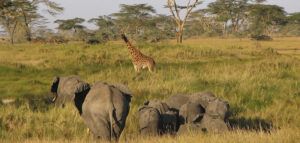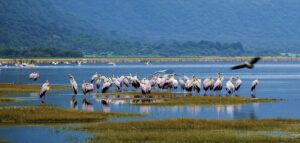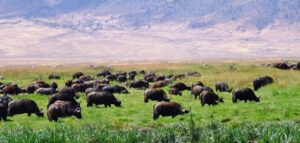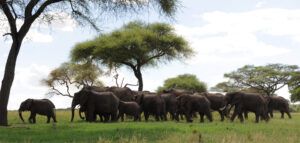Visit Serengeti National Park
The Serengeti National Park is a Tanzanian national park in the Serengeti ecosystem in the Mara and Simiyu regions. It is famous for its annual migration of over 1.5 million white bearded (or brindled) wildebeest and 250,000 zebra and for its numerous Nile crocodile.The Maasai people had been grazing their livestock in the open plains of eastern Mara Region, which they named “endless plains”, for around 200 years when the first European explorer, German Oscar Baumann, visited the area in 1892. The name “Serengeti” is an approximation of the word used by the Maasai to describe the area, siringet, which means “the place where the land runs on forever.”The first Briton to enter the Serengeti, Stewart Edward White, recorded his explorations in the northern Serengeti in 1913. Stewart returned to the Serengeti in the 1920s and camped in the area around Seronera for three months. During this time, he and his companions shot 50 lions.Because the hunting of lions made them scarce, the British colonial administration made a partial game reserve of 800 acres (3.2 km2) in the area in 1921 and a full one in 1929. These actions were the basis for Serengeti National Park, which was established in 1951.The Serengeti gained more fame after the initial work of Bernhard Grzimek and his son Michael in the 1950s. Together, they produced the book and film Serengeti Shall Not Die, widely recognized as one of the most important early pieces of nature conservation documentary.
To preserve wildlife, the British evicted the resident Maasai from the park in 1959 and moved them to the Ngorongoro Conservation Area. There is still considerable controversy surrounding this move, with claims made of coercion and deceit on the part of the colonial authorities.
The park is Tanzania’s oldest national park and remains the flagship of the country’s tourism industry, providing a major draw to the Northern Safari Circuit encompassing Lake Manyara National Park, Tarangire National Park, Arusha National Park, and the Ngorongoro Conservation Area.
Serengeti National Park entrance fee
The Serengeti National Park entrance fee for international visitors is $60 per person per day.
For East African residents, the fee is $30 per person per day.
Tanzanian citizens pay 10,000 TZS per person per day.
These fees are subject to change, so it is best to check for the most up-to-date information before visiting the park.Permutours.com Tweet






